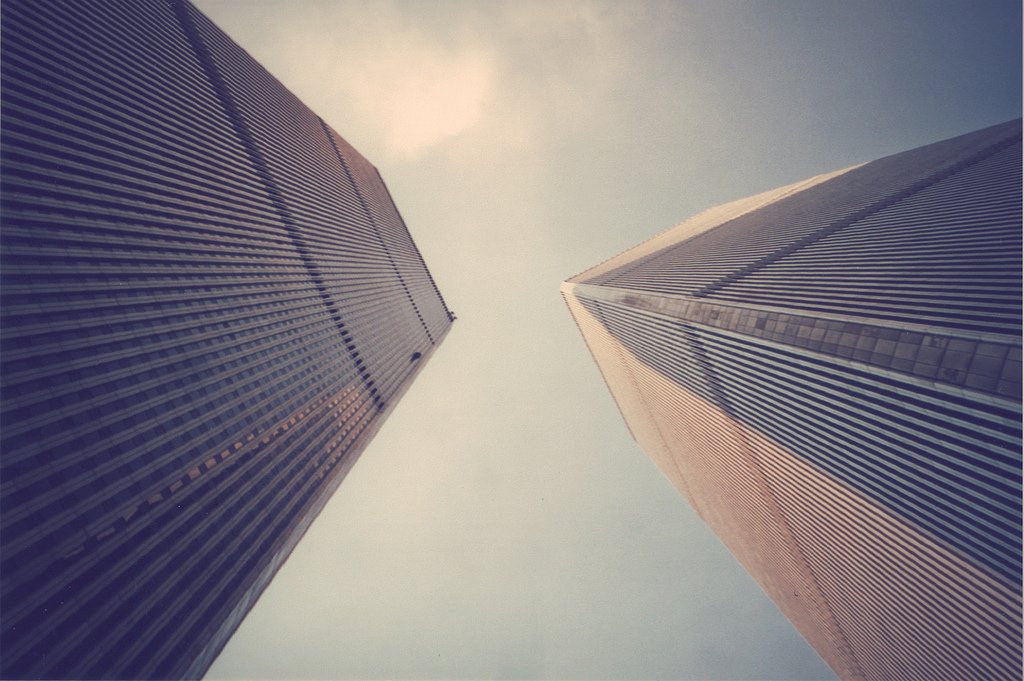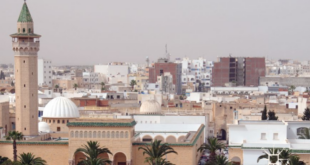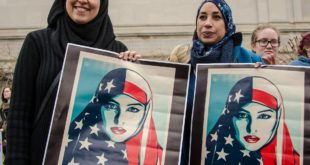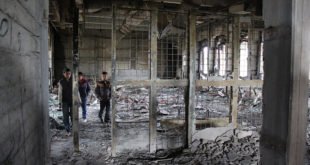In the spring of 2002 Al Qaeda selected Yosri Fouda, Al Jazeera’s then London Bureau Chief, to interview two of the most wanted leaders within the organization, Khalid Sheikh Mohammed and Ramzi Bin Al-Shiba. This represented the first public admission that Al Qaeda was in fact responsible for the attacks of September 11, 2001. Several months after the interview, Ramzi Bin Al Shiba was captured in Pakistan. Khalid Sheikh Mohammed was caught the following year. Today, both men remain in detention at Guantanamo Bay. Shortly after his documentary aired, S. Abdallah Schleifer interviewed Fouda about the experience. The account of his two-day interaction with the men offers substantial insight into the inner workings of Al Qaeda and the challenges faced by a journalist covering such a high profile and complex story. At the time of the interview, Fouda foresaw the decline of the organization, but his analysis of their ideological underpinnings and organizational structure remain useful today. Here we revisit their conversation.
Schleifer: Your special report “Top Secret: The Road to September 11th” broadcast in two installments September (2002) by Al Jazeera contains the most detailed and undisputed confirmation by Al Qaeda leaders Khalid Sheikh Mohammed and Ramzi Bin Al-Shiba that the organization carried out the 9/11 terrorist attacks. Why you?
Fouda: Yes, that question “Why me?” did come up. Once my blindfold and sunglasses, which hid the blindfold, had been removed and I had gotten over the shock of finding myself in a nearly empty apartment with Khalid Sheikh Mohammed, one of the most important figures in the Al Qaeda leadership, and Ramzi Bin Al-Shiba, who had a $25 million bounty on his head at the time, just as Khalid did, I asked them “Why me?” and they said Sheikh Abu Abdallah [Osama Bin Laden’s kunya or honorific] had picked me. Again I asked, “but why me?” They said there are other journalists both inside and outside of Al Jazeera who are thought of as having some degree of sympathy with their cause. So for that very reason, they said they wanted to have this story done by someone “more secular in his professional approach” so their message would carry more credibility.
S: Interesting. Rather sophisticated too, like so much of their operation.
F: It was, and it confirmed my initial impression that there is someone who understands media, and particularly television, inside Al Qaeda. I already had that impression, not just because of the video tapes that were sent out before and after 9/11, but because after I got the first phone call from a man who turned out to be an intermediary asking for my fax number, I received a three-page fax with an outline of a program Al Qaeda had in mind for me to do to mark the first anniversary of 9/11. The fax proposed story ideas, locations and personalities. I later learned Ramzi Bin Al-Shiba passed it on to the intermediary who made the contact.
From the beginning we had some sort of unwritten contract or understanding. They knew me and they knew what my program [Top Secret] is about. When I made the decision to accept their invitation and go for the story I knew it was going to be about information and not just rhetoric. The interview wasn’t some sort of discussion and I didn’t go there to argue with them or judge them.
Khalid got right down to business, laying down the conditions that I would not talk about their means of communication, nor would I mention their real code-names and if I was asked about what they now looked like, I was to say they looked exactly like the photos in circulation that I would be shown. Then I was asked to place my hand on the Quran and solemnly swear to this.
Khalid struck me as shrewd and very direct. He was obviously annoyed that I had been allowed to bring my mobile phone with me. He snatched it, switched it off, removed the SIM card and battery and put it away in another room. After prayers, which were led by Ramzi, I asked him if he was traveling, since he had used the shorter prayer form for travelers. Ramzi said, “Yes, we’re traveling. You didn’t expect us to show you where we live, did you?”
Khalid told me there would be no filming on the first day and that they would provide me with a camera and cameraman on the next day; that they would provide for everything. Ramzi added that I would be taken straight from the safe house to the airport when they were finished.
Then with very little fanfare Khalid introduced himself as head of the so-called Al Qaeda military committee and Ramzi as coordinator of the 9/11 operation, which they would describe either as “The Holy Tuesday Operation” or “The Martyrs’ Operation” or the “Manhattan and Washington Raids” using the old Arabic word ghazwa from the time of the Prophet to describe raids against enemies which were like modern-day commando operations.
S: Why do you say “so-called”? Did they use that phrase?
F: Not at all, but that was how I felt at that moment. I hadn’t thought of Al Qaeda as a formal organization and suddenly I’m in front of somebody introducing himself as the head of the Al Qaeda military committee. They have committees and departments and Khalid told me they have a department for martyrs; it was from that department that they picked the men who would accompany the hijacker pilots and leaders and he said they were never short of people, who in his own words, were “willing to die for Allah.” His problem was actually the opposite, having to choose from among them, to pick the right people who would suit the requirements of any particular operation. In this case, at least at the leadership level, suitable people familiar with the West.
It became very clear to me, not just from the titles, but from the relaxed, calm, and easy way they talked about the preparations and planning for two days that Khalid and Ramzi were two of the master planners of 9/11. They were both proud of what they had organized. Ramzi speaking calmly and with authority while Khalid would make decisive interventions. Khalid was the more active of the two. His hands never stopped moving as he walked around us.
Ramzi and Khalid told me how two and a half years prior to 9/11 they took the decision within the military committee to attack inside America and they started to look for targets. Khalid said that the first thing that jumped into their minds was striking at a couple of nuclear facilities but they dropped the idea for now, concerned that it might “get out of hand.” He wouldn’t elaborate beyond that.
S: So that means Khalid was implying that Al Qaeda reserved the right to blow up nuclear facilities in the future?
F: Absolutely. That’s exactly what I got from him and I think he wanted to underline this. Incidentally it was Khalid, as chairman of the military committee, who had come up with the proposal that the “martyrdom operation” in America should target prominent buildings. His plan was similar to an earlier one to send 12 airliners simultaneously into American landmarks. Intelligence agencies knew about this earlier plan, “The Bojinka Plot” they call it because it went disastrously wrong. Khalid had worked on it in 1994/95 with his nephew Ramzi Youssef, who was on the run after the first World Trade Center bombing [1993]. Youssef was hiding out in Manila working on bomb designs and initial logistics, but he fled his apartment when chemicals he had stashed there for making bombs caught fire and he left behind a laptop containing full details. Within months he was arrested in Pakistan. Khalid who had just arrived in Manila at the time of the fire managed to escape and he wasn’t heard of again until his name was given to FBI interrogators by Abu Zubaydah, a senior Bin Laden deputy, who was arrested after a gunfight in March 2002. Now Khalid was explaining to me how he not only resurrected the “Bojinka” plot, but had refined it into a devastatingly effective act of war. In 1999, Mohammed Atta, an Al Qaeda “sleeper” who had been studying and working in Hamburg since 1992, was earmarked along with other sleepers by the military committee to pilot the death flights.
Ramzi was the coordinator of 9/11 but I think even here he came to be called the leader or coordinator by default. He originally wanted to join the other 19 hijackers, but was turned down twice when he tried to get an entry visa. American officials said Ramzi was turned down because he was implicated in the USS Cole attack.
S: American intelligence sources knew at the time they turned Ramzi down that he was implicated in the Cole attack. That’s rather odd, because if they knew that and turned him down for that reason, you’d think they would have wondered who else was at that flight school and why? Or even more to the point, they would have issued him a visa just to get him into the United States and grabbed him for the Cole attack. If that’s the case it fits right into a list of intelligence blunders by both the FBI and the CIA that have already surfaced in the press and in Congressional hearings.
F: Yes that’s right. I mean if you consider this angle, it’s really large because of certain coincidences, at least seven or eight other missed opportunities like this one, that just don’t leave one with a comfortable sense; that suggest that 9/11 could actually have been aborted.
But there is another thing. You know I was interviewed on CNN on the eve of the first anniversary of 9/11 and Jonathan Mann, who was interviewing me for his program “Inside” challenged my information during the taped interview, when I referred to the case of a group of Israelis taking pictures with a clear view of the World Trade Center, waiting for the first plane to hit. I told him that I had it on record from Vince Cannistraro, the CIA’s former chief of operations for counterterrorism, and off record from the FBI and I used it: That the Israelis were there in position before the first plane hit. Well Jonathan Mann refused to accept this and he kept saying that was impossible and I kept telling him to go look at my footage for Part I which was already in CNN’s hands in Washington DC.
What happened is that they had asked me to go on Mann’s show live and I now regret that I didn’t but I was so tired at the time that I had requested he do the segment with me at a reasonable hour for Qatar and tape it. So when the interview appeared on his show, the part where I allude to the Israelis and quote Cannistraro was cut out. Incidentally when the Americans finally realeased the Israelis and sent them back to Israel the cover story was provided by Shimon Perez who told the press that the arrested Israelis were indeed intelligence operatives but they were in New Jersey monitoring US-based Hamas operatives and had no prior knowledge of the 9/11 attack.
--
S: Shortly after your documentary was aired around the anniversary of 9/11, Ramzi was caught by the Pakistanis and turned over to American intelligence officers. This capture was described by President Bush as a major boost in the war on terrorism, but you found yourself initially denounced as “a pig and a traitor” on various Islamist websites and you told the Washington Post (which reported as did other media that the interview had taken place in Karachi in June 2002) that you “couldn’t blame people for thinking what they do” and that you yourself wondered at first if there could have been some unforeseeable link.
F: Yeah, well there were rumors going around at the time that American intelligence agents were secretly planting tracking devices on Al Jazeera correspondents likely to be in contact with Al Qaeda. But when you think about it, that doesn’t make sense. If that were the case why would the intelligence apparatus wait for all the time to act? According to the official version, the interviews took place in June but they didn’t get hold of Ramzi until early mid-September. Actually this question of dates is very important for another reason. All of these Islamist websites that were denouncing me alluded to my interview as taking place in June.
I lied [about the date]. I lied because I needed to lie. I’ll tell you why: I thought, maybe even expected, that if something went wrong and I needed to get in touch with them through a website or a statement or a fax or whatever, the people that I met then and the people who were around them, they would be the only ones who would know that I had met them one month earlier than I let on, and so I’d know I was talking to the right people.
So after the first wave of denunciations a pro-Qaeda website “jehad.net” put up a statement online in the name of Al Qaeda clearing me of any blame or connection with Ramzi’s arrest and I knew this was an authentic communiqué because it alluded to the interview taking place in May.
I cannot blame some people for making that sort of association. Look at the coincidence of the timing of the broadcast of Part II of the documentary with the Ramzi interview, and the announcement of the arrest. Until now I am not really sure whether the arrest happened that day or maybe a little less than a week before because there is a Reuters report that Ramzi was actually arrested on the 9th. Part II was broadcast on the 12th. I’m also saddened at the fact that the timing of the arrest shifted the attention of viewers away from the content of the documentary, from the very art of journalism, and the making of the difficult story that it was. It became instead part of a breaking news story about the arrest of one man.
--
S: Were you surprised that there was no operation during the anniversary of 9/11?
F: No, not really, although they tried to give me the impression that the organization was still alive and kicking and they would like to launch a thousand operations like 9/11, that sort of talk didn’t strike me as really serious. I think they are in a lot of trouble. I think they would be happy just surviving everything that’s been happening since 9/11. They obviously have problems. That feeling I have that the organization is going through very difficult times is stronger today than ever. At the time I was working on the documentary I felt that if Bin Laden were really dead as some think, particularly given Khalid’s slip of tongue when he referred to Bin Laden in the past tense, then Ramzi Bin Al-Shiba would have been the natural replacement. Ramzi made an enduring impression upon me. His philosophy, even his vocabulary was very much like Bin Laden’s. At just 30 years of age he [eclipsed] his master with field experience in coordinating an unprecedented operation on Western soil. Yet Ramzi also has Bin Laden’s serene charm, zest, and religious knowledge.
S: Religious knowledge? Al Azhar would certainly contest that. From an orthodox, Azhari perspective all of those fatwas that Bin Laden and Ayman Al-Zawahiri issued which Ramzi obviously believes in, were totally off the wall and thoroughly condemned. I’m not saying that Bin Laden wasn’t pious, but the idea of him being qualified to issue fatwas, as having some sort of deep knowledge of the religion? The only people who have reason to believe he possesses this authority are his own followers.
F: There is something about Ramzi and the people around him; it’s religious and more than religious. It’s like a certain psychological or psychic state of certainty they are living in. It’s very significant that they refer to the “Holy Tuesday Operation” first as holy and secondly as a ghazwa – the raids launched at the time of the Prophet. It was used during that time but not after. It tells you a lot; psychologically they are convinced they are literally reliving or living in that time.
--
S: Your documentary is built around the actual voice of Ramzi telling you how Al Qaeda pulled it off. Despite substantial documentation, so many Arabs were in a state of denial and many are still in a state of denial, insisting that Al Qaeda or any Arabs for that matter could not have anything to do with this operation, that this was a Mossad or CIA operation.
F: I’m very very sad, being an Egyptian and having graduated from Cairo University and then studying TV Journalism at the American University in Cairo, to know that just about every newspaper and TV station in the world were dying to have a couple of words from me on this story except for the Egyptian press. You know, I’m told that some of the leading columnists in Egypt criticized my coverage and asked rhetorically: “How come Yosri Fouda had access to American airports? There must be something between him and the CIA.” Until this day I get some emails from people actually questioning whether the voice I had on tape was actually Ramzi’s voice. And I get the feeling it’s a waste of time for me to try to assure them, to convince them that yes, this tape has all of the same answers that he made to me face-to-face when I was with him.
 Arab Media & Society The Arab Media Hub
Arab Media & Society The Arab Media Hub





